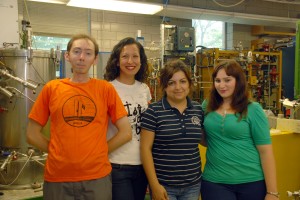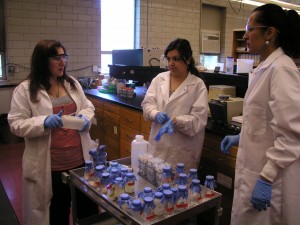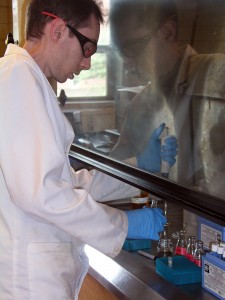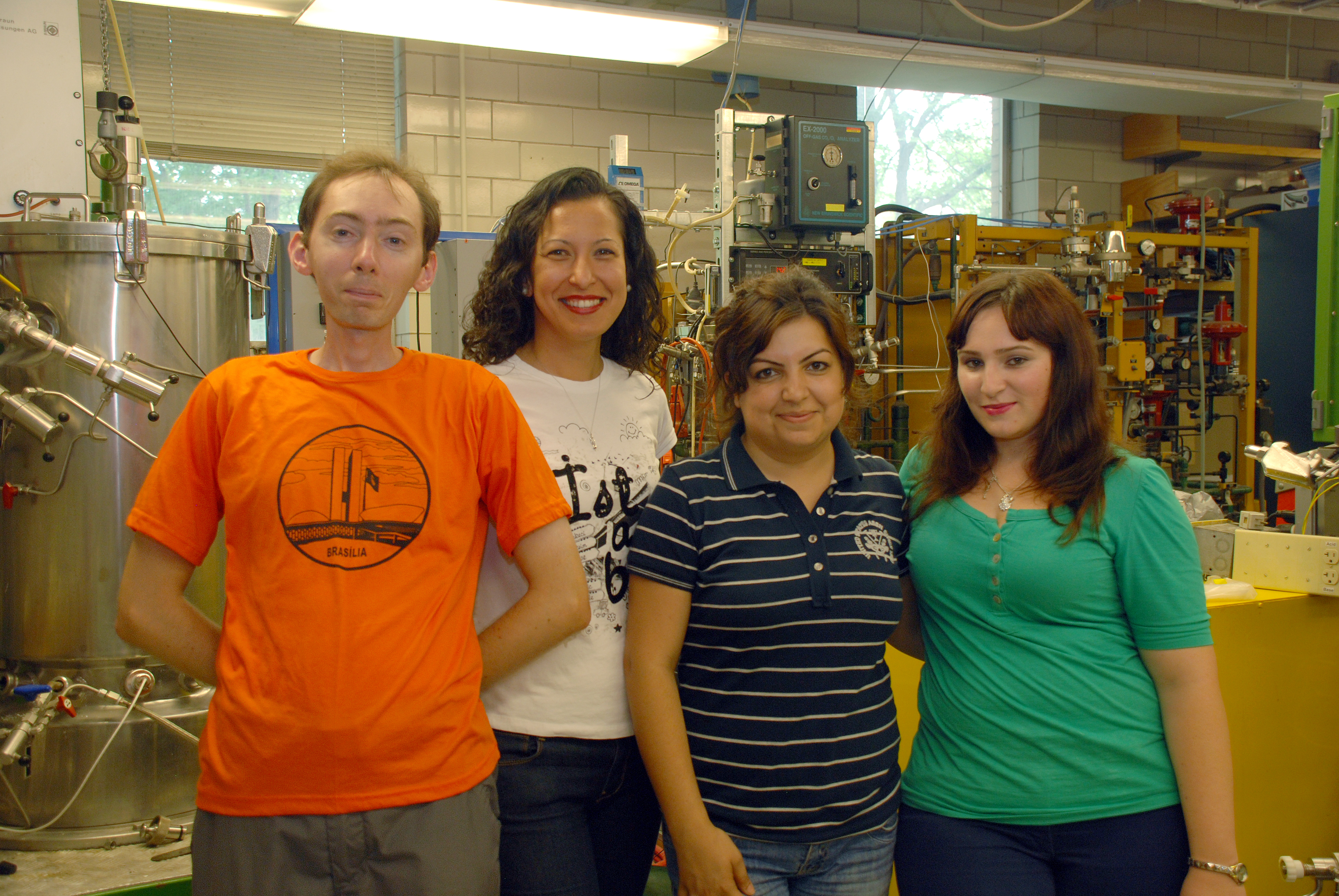
Campus often seems quiet and barren during the summer months without the buzz of students, but tucked away in laboratories, researchers are hard at work. Of these scientists and engineers, some have traveled from all over the world to conduct cutting-edge research at Iowa State. This year, Vlasta Klima Balloun Professor of Engineering Hans van Leeuwen has had the opportunity to collaborate with four visiting scientists, a number that is unusually large and speaks to the excitement that surrounds van Leeuwen’s work.
The visiting scientists have been working together with van Leeuwen’s permanent research team to advance the concept of using fungi to improve ethanol production. “All four have been helping us considerably with various fungal application research projects in the hopes of making better co-products for the biofuels industry and producing a cleaner environment,” explained van Leeuwen.
Their work takes place in a pilot-scale facility established to grow fungus on corn thin stillage from a local bioethanol plant. Ultimately, the group is looking for industrial applications of this fast-growing, edible fungus.
Three of the visiting scientists are from Turkey: H. Duygu Ozsoy, assistant professor of Mersin University in southern Turkey; her graduate student Ezgi Bezirhan; and Elif Alaydin, research assistant at Zonguldak Karaelmas University in northern Turkey. This group is responsible for testing the fungal degradation of bioplastics. Ozsoy, who is in her fourth visit to Iowa State, says she has become invested in the work because the fungal application of bioplastics historically lacks proper research and documentation, compared to the well-known bacterial biodegradation of bioplastics.

The underlying issue of this aspect of the project lies in the large amounts of waste that are being produced by plastic manufacturers. To lower environmental effects caused by regular plastic, manufacturers have begun developing bioplastic materials. Unfortunately, the bioplastic is still causing a significant amount of waste when discarded. Duygu and her group of scientists are working on ways to recycle bioplastic waste by creating other products from the bioplastic. “Our goal is to turn waste into valuable product,” explained Ozsoy. “We know that bioplastics are potential wastes of the future, and we want to turn them into simple compounds like sugar, which can be used in the bioethanol industry.”
Working closely with Ozsoy, Bezirhan and Alaydin have also contributed significantly to the project. Bezirhan, who is responsible for daily measurements in the lab, found her work to be very compatible to the style of Alaydin, who quickly picked up the project as she arrived shortly before Ozsoy and Bezirhan set for departure. Ozsoy says the well-selected team members have made the process much easier and enjoyable.
Although Ozsoy’s time at Iowa State has come to an end, she says she will be hard at work in her home country furthering her research. Through a joint effort of the National Science Foundation and a local research agency in Turkey, Ozsoy hopes to write a proposal for an international collaborative project with van Leeuwen.
The fourth visiting scientist, Nicholas Davidson, master’s student at King Abdullah University of Science and Technology (KAUST) in Saudi Arabia, is originally from Scotland. Davidson says that Scotland doesn’t have much of a biofuel industry right now, but his lectures at KAUST impressed upon him the importance the industry will have in the near future.
His research focused on promoting fungal growth on thin stillage from a local brewery, which is quite acidic and has a high chemical-oxygen demand (COD) that is very dangerous to aquatic life and requires expensive treatment and cleanup prior to outflow to rivers or reuse within the brewery itself. Davidson, along with Mary Rasmussen, post-doctorate research associate, has seen a promising drop in COD in the new substrate as the fungus grows. “If we can succeed in growing the fungus, we will be able to offer the technique to industries that can then produce fungus for sale as animal feed. The growth also lowers the COD of the effluent, requiring less treatment before disposal,” Davidson explained.. “This should lead to an offset in the cost of bioethanol production, making it more economically viable as a fuel source.”

While advancing his research, Davidson also got the chance to experience the wonders of Iowa State’s campus. Noting the beauty of the campus and the friendly and outgoing atmosphere, he has applied for a postgraduate position at Iowa State. Until he learns whether he has been hired, he hopes to complete as much work as he can to help the group.
In addition to the four visiting scientists who have been vital to the advancement of the project, van Leeuwen’s permanent group of scientists work on the project throughout the year. There are many people behind the scenes in the lab, but most evident are Rasmussen, and graduate students Dan Erickson, Chris Koza, and Debjani Mitra, whose continual and consistent involvement in the research is important to the project. “We appreciate interest and collaboration of our visiting scientists. Their contributions will help our permanent group continue to work toward reaching our research goals,” said van Leeuwen.
Van Leeuwen also noted that he and his group appreciate all those who have supported the visiting scientists, including the Turkish High Education Council, Turkish Airlines, and King Abdullah University of Science and Technology. For photos of the four visiting scientists and their research, please visit our Flickr site.
